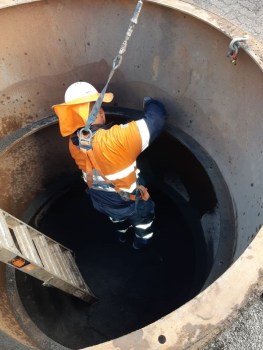
Physical security is more important than ever, writes Graeme Philipson. In this article he looks at the most secure locks and keys available, used by governments, law enforcement agencies and commercial organisations where security is paramount. Enter the EVVA 4KS system.
We live in a security conscious world. The threat and reality of crime and terrorism pervade modern society.

Security takes many forms – physical, electronic and even psychological. Cybersecurity gets most of the attention nowadays, but the most basic kind of security of all is still one of the most important. Ultimately, the physical level is the foundation of any security system. The most sophisticated techniques and practices are useless if an intruder can get into your premises or gain access to your valuables.
As you might expect, there are certain industry sectors where physical security is paramount. Defence and law enforcement are at the top of this list. They demand maximum effectiveness, often in hostile physical environments. The ability to securely lock something away has never been more important.
The security industry is very competitive, but at the high end there are just a few suppliers able to meet the most demanding needs for physical security. One of the market leaders is Austrian company EVVA, which recently celebrated 100 years in business and is represented in Australia by Davcor Group. EVVA has implemented a lock and key technology known as 4KS, which takes the conventional technology to a level way beyond what was taken for granted just a few years ago.
Locks and keys explained
Geoff Plummer is an Executive Business Manager at Davcor, responsible for the EVVA range. “In security we never say never. We can’t say no one has ever compromised a 4KS lock, but we can say we never heard of anybody doing it. There are even lock picking forums on the Internet, which say it’s probably the safest system out there.”
There are four ways to break a lock, explains Plummer, and 4KS guards against them all. “There is impressioning, which relies on marks being left in the blank key. 4KS uses curved sliders along the side of the key rather than indentations along the edge, which makes this technique almost impossible.
“There is conventional picking, also negated by the 4KS slider alignment. There is bumping, the method Harry Houdini used, which relies on springs in the lock. 4KS has no springs in the sliders. And then there is the brute force of drilling, made extremely difficult by 4KS’s hardened carbide and additional anti-drill pins and teflon coating designed to deflect any drilling attempts.”
The 4KS technology is available in Australia only through a tightly controlled network of specialist locksmiths that have met strict dealership appointment criteria. So stringent are the requirements that only a few dozen locksmiths around Australia are licensed to sell and maintain the technology.
High government standards
The extremely secure nature of the 4KS technology has made it popular with government, in Australia and globally. As might be expected in these difficult times, the Australian Government has high standards for any organisation or technology involved in public sector security.
The standards are the responsibility of a standing inter-departmental Security Construction and Equipment Committee (SCEC), which evaluates security equipment for use by all Australian Government departments and agencies. Part of its remit is the SCEC Approved Locksmith scheme.
4KS is SCEC approved to Security Level 3 (SL3), the second highest level overall and the highest obtained by any mechanical locking system. The program is administered by the Attorney General’s Department, which has developed a Protective Security Policy Framework (PSPF). There is substantial input from the Australian Security Intelligence Organisation (ASIO), which runs regular training decisions on the Government’s physical security requirements.
The PSPF provides guidelines on governance, information security, personnel security and of course physical security. The Government has its own testing facilities. “They won’t tell us how they test the system,” says Plummer. “They just tell us whether it has passed or not. It’s all on a need-to-know basis.”
4KS is used by many arms of government and in defence and law enforcement. Understandably, they are reluctant to be used as reference sites. Plummer cites examples such as pistol safes and perimeter access around defence bases. The technology is also widely used in educational institutions, transport and logistics, retail, resorts and hotels, and utilities.
The changing nature of security
Plummer lists two other important advantages of 4KS – its patents and its resistance to harsh environments. “The system is patented until 2035, way beyond that of our competitors. That’s very important, because it means that nobody else can use the technology during that time. It can’t be copied, reverse engineered, or compromised by any other manufacturer.
“Another key feature of 4KS is it is extremely physical robustness. The springless design and the high quality of the materials we use means that the system can be used in extreme environmental conditions. The keys are made of nickel-silver alloy, and the fact that they do not have deep cuts in them, like conventional keys, means that they are virtually unbreakable.”
He explains that all the essential locking elements are manufactured from high quality carbide and have an anti-friction coating, guaranteeing high durability and wear resistance even in the toughest conditions. “The sliders are not tensioned by springs which can break or jam, making them suitable for use in dirty, dusty or salty environments. Keys have been cycle tested to 100,000 operations.”
Plummer believes security awareness in the public and private sectors will only increase. “Many organisations have the title of Chief Security Officer (CSO),” he says. “They are responsible for all aspects of the organisations security. Where previously they would be responsible for conventional security and Chief Technology Officers or IT Managers would be responsible for cybersecurity. We have been seeing a convergence in the industry where CSOs are coming out of the IT side, with the increased sophistication of cyber security attacks and countermeasures. But there is also an increased awareness of physical security as an important component of the overall security strategy. That’s where we come in.”
Love it or hate it, an increased emphasis on security is a fact of life. Plummer is seeing double-digit growth in 4KS and Davcor’s other security products. “Security is top of mind. Nowadays it’s not an add-on. It’s built in from the ground up.”
How 4KS works
EVVA’s patented 4KS lock and key system uses an innovative technique to minimise the number of moving parts and the ability for the key to copied or the lock to be picked.
The keys contain curved cuts, hence the name of the system (‘4KS’ is based on the German acronym for ‘Four Curve System’). When the key is inserted, the locking elements in the 4KS cylinders slide along the curves, minimising resistance. Conventional master key systems employ spring-driven locking elements, which introduce physical resistance and a point of mechanical failure.
With 4KS a total of 12 springless solid sliders are brought into a specific position via positive control of the six key curves, scanned by two control bars. A bottom bar in the plug controls the additional coding of the key. That means a 4KS key is scanned a total of four times, compared to just once with conventional pin systems. The overlapping curve key cuts ensure that key manipulation is almost impossible. Keys can be inserted either way – there is no upside down.
The complex coding system enables the creation of a hierarchy of keys to suit the requirements of very large sites. 4KS is designed to provide a highly complex multi-level master key system that can be scaled for future expansion as needed. There are up to 133 billion possible combinations of key codes.
The 4KS key is impossible to reproduce without an advanced level of specialist knowledge. Key machines capable of cutting 4KS are subject to stringent licensing provisions and require EVVA approval to be enabled to cut 4KS. Unlike many master key systems, key machines are not able to decode the keys – nor can they be decoded by key matching.
Comment below to have your say on this story.
If you have a news story or tip-off, get in touch at editorial@governmentnews.com.au.
Sign up to the Government News newsletter






Sue Phillips on: 15 councils participate in SA emissions reduction trial
Garth Daddy on: War memorial contracts fudged, audit finds
Roger Buhlert on: New VLGA appointment vows to lift governance standards